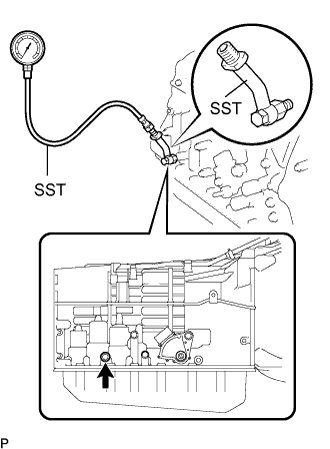Transmission. Lexus Gs430, Gs300. Uzs190 Grs190
A761E Automatic Transmission. Lexus Gs430, Gs300. Uzs190 Grs190
Electronic Controlled Automatic Transmission System -- Hydraulic Test |
| PERFORM HYDRAULIC TEST |
Measure the line pressure.
- NOTICE:
- Perform the test at the normal operating ATF (Automatic Transmission Fluid) temperature: 50 to 80°C (122 to 176°F)
- The line pressure test should always be carried out in pairs. One technician should observe the conditions of wheels or wheel stoppers outside the vehicle while the other is performing the test.
- Be careful to prevent SST hose from interfering with the exhaust pipe.
- This Check must be conducted after checking and adjusting engine.
- Perform under condition that A/C is OFF.
- When conducting stall test, do not continue more than 5 seconds.
Warm up the ATF (Automatic Transmission Fluid).
Lift the vehicle up.
Remove the test plug on the transmission case center right side and connect SST.
- SST
- 09992-00095(09992-00231,09992-00271)
Lower the vehicle.
Fully apply the parking brake and chock the 4 wheels.
Start the engine and check idling speed.
Keep your left foot pressing firmly on the brake pedal and shift into D position.
Measure the line pressure when the engine is idling.
Depress the accelerator pedal all the way down. Quickly read the highest line pressure when engine speed reaches stall speed.
In the same manner, do the test in R position.
Specified line pressure: Condition D position kPa (kgf / cm2, psi) R position kPa (kgf / cm2, psi) Idling 355 to 425 kPa
(3.6 to 4.3 kgf/cm2, 51 to 62 psi)631 to 731 kPa
(6.4 to 7.5 kgf/cm2, 92 to 106 psi)Stall test 1,277 to 1.387 kPa
(13.0 to 14.1 kgf/cm2, 185 to 201 psi)1,462 to 1,670 kPa
(14.9 to 17.0 kgf/cm2, 212 to 242 psi)Evaluation: Problem Possible cause If the measured values at all position are higher - Shift solenoid valve (SLT) defective
- Regulator valve defective
If the measured values at all position are lower - Shift solenoid valve (SLT) defective
- Regulator valve defective
- Oil pump defective
If pressure is low in the D position only - D position circuit fluid leak
- Clutch No.1 (C1) defective
If pressure is low in the R position only - R position circuit fluid leak
- Clutch No.3 (C3) defective
- Brake No.4 (B4) defective
- Shift solenoid valve (SLT) defective
 |